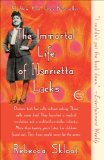My school’s Upper School read this summer was The Immortal Life of Henrietta Lacks by Rebecca Skloot. I initially picked this book up some years ago, but something interrupted my reading, so I wasn’t able to finish it. I had always wanted to go back and finish it, so I was glad of an opportunity.
If you are not familiar with the book (though probably most people are by now), it’s the story of Henrietta Lacks and her family (as well as how Rebecca Skloot obtained Henrietta’s story). Henrietta Lacks was a patient at Johns Hopkins Hospital in 1951. She had cervical cancer. Her doctor excised tissue samples including both normal cells and cancer cells. Her cancer cells, known to science as HeLa, became the first immortal cell line. It has been used to create the polio vaccine, and also conduct research in AIDS, various forms of cancer, and innumerable other projects. Henrietta Lacks’s family, however, did not know about the research done with her cells, nor did they benefit monetarily from their use. This book explores not only the story of Henrietta Lacks’s contribution to science but also the ethical dilemma introduced by lack of informed consent, as well as racism and poverty.
This book raises some interesting questions. I found it fascinating. I love reading about people’s stories. However, the story, in this case, is in the hands of a white woman who is no part of the Lacks family. Some have argued she blurred the line of objectivity toward one’s subject in how close she became with the Lacks family, particularly Henrietta’s daughter Deborah. I have also heard others argue that Skloot took advantage of the Lacks family as much as Johns Hopkins did. I would argue she was not going to obtain the story without blurring that line, and it’s also possible that family members would not have been able to tell the story without Skloot’s interest and help. Still, it’s an important consideration in terms of what happened to Henrietta Lacks’s cells. The cells are outside of the control of the family, and many argue that it’s too hard to figure out how to compensate the Lacks family, who have struggled in poverty and often (ironically) without health insurance. Anyone can order a vial of HeLa cells online, but the Lacks family receives no part of the profits on those sales. HeLa cells have benefited humanity tremendously, and a great deal of good has come from the research done with them, but very little consideration has ever been given to her family. For instance, Henrietta Lacks’s genome was released a few years ago, though it was later withdrawn after the Lacks family voiced concerns about privacy. In this era, when information like that is out there, it’s impossible to put back in the bottle. Henrietta Lacks’s medical records have also been released. It’s a shame the Lacks family has been treated the way it has, and though it’s hard to say whether or not the treatment would have been different had she been a white woman with the means to pay for her healthcare, my personal belief is that her race and class played a role in how she and her family were treated. It’s still true that once tissue is excised from our bodies, it is no longer considered ours, and doctors and scientists can do whatever they like with it. I suspect that will change some time down the road, but right now, case law says we do not own our tissue once it’s no longer part of our body. Think of all the times you may have had blood drawn, or a biopsy. Or even signed up for 23 and Me or a similar DNA site. In fact, the agreement you make with 23 and Me is that your DNA can be used for research, and you don’t get your results about family, ancestry, or health information without making that agreement.
This books definitely exposes interesting ethical issues in science and medicine, and it finally tells the story of the woman behind the HeLa cell line, and I think both stories needed to be told. I really enjoyed reading the book. It raised a lot of questions and made me think.
Rating:




 I am counting this book for the Backlist Reader Challenge, as I have been meaning to go back and read it after starting it years ago. This time, I started over at the beginning rather than pick up where I left off, which turned out to have been a good idea since I read the book quite some time ago.
I am counting this book for the Backlist Reader Challenge, as I have been meaning to go back and read it after starting it years ago. This time, I started over at the beginning rather than pick up where I left off, which turned out to have been a good idea since I read the book quite some time ago.



